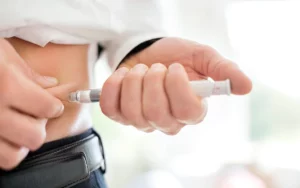Welcome to our comprehensive exploration into the world of Type 1 Diabetes (T1D), a condition that affects millions globally. This blog aims to delve into the diabetes 1 cure that includes the latest advancements, research, and potential paths toward a cure for T1D. We’ll navigate the complexities of this autoimmune disease, understanding its mechanisms, and the innovative therapies and technologies that are shaping its future treatment.
Contents
What Are Some Diabetes 1 Cure?
 T1D is an autoimmune condition where the body’s immune system attacks the insulin-producing beta cells in the pancreas, leading to a lifelong dependence on insulin therapy. However, significant strides have been made in the management and treatment of T1D. And ongoing research holds promise for future breakthroughs.
T1D is an autoimmune condition where the body’s immune system attacks the insulin-producing beta cells in the pancreas, leading to a lifelong dependence on insulin therapy. However, significant strides have been made in the management and treatment of T1D. And ongoing research holds promise for future breakthroughs.
Here are some of the key areas of research and emerging therapies that are aimed at effectively treating or potentially diabetes1 cure:
Pancreatic Islet Transplantation
This innovative approach involves transplanting islets. These are clusters of cells in the pancreas that include insulin-producing beta cells, from a donor pancreas into a person with T1D. The transplanted islets can take over the role of producing insulin. However, there are challenges: the availability of donor islets is limited, and recipients must take immunosuppressive drugs for life to prevent their immune system from rejecting the transplanted cells.
Stem Cell Therapy
A groundbreaking area of research, stem cell therapy holds the potential to treat T1D. Scientists are exploring ways to use stem cells, which can turn into any cell type in the body, to create new, insulin-producing beta cells. These cells could then be transplanted into patients with T1D, potentially restoring their ability to produce insulin. This approach aims to replenish the body’s lost beta cells, but it still faces significant hurdles, such as ensuring the safety and longevity of the transplanted cells and preventing an immune response against them.
Immunotherapy
This treatment focuses on the autoimmune aspect of T1D. The aim is to modify or halt the immune system’s attack on the body’s beta cells. By intervening in the autoimmune process, immunotherapy could potentially prevent the destruction of beta cells in newly diagnosed patients or those at high risk of developing T1D. Various methods, including monoclonal antibodies and other drugs, are being studied to achieve immune tolerance and protect beta cells.
Artificial Pancreas Systems
While these systems don’t cure T1D, they represent a significant advancement in disease management. An artificial pancreas system combines a continuous glucose monitor (CGM) with an insulin pump, using algorithms to automatically adjust insulin delivery based on blood sugar levels. This technology can significantly improve glucose control and reduce the burden of daily diabetes management, mimicking the function of a healthy pancreas more closely than traditional treatments.
Gene Therapy
Gene therapy offers a novel approach to treating T1D by addressing the underlying genetic and cellular mechanisms. Researchers are exploring ways to use gene therapy to either protect the remaining insulin-producing cells or reprogram other cells in the pancreas or the body to produce insulin. This approach could potentially restore insulin production in people with T1D. However, it’s still in the early stages of research and faces challenges such as delivering the therapy safely and effectively.
Vaccine Research
Vaccines to prevent or modify the course of T1D are an area of active research. The goal is to develop a vaccine that can induce the immune system to tolerate beta cells, thus preventing or stopping their destruction. This could potentially be used in individuals at high risk of developing T1D (like those with a family history) or in newly diagnosed patients to preserve their remaining beta cells. While this approach is promising, it’s still in the experimental phase and requires more research to understand its efficacy and safety.
Each of these areas represents a unique approach to tackling the complex challenge of T1D. While none of them are yet established cures, they offer hope and a glimpse into the future possibilities of treating and potentially curing this chronic condition.
Are There Any Natural Cures For Diabetes Type 1?
 Generally, there are no natural cures for Type 1 Diabetes (T1D). T1D is an autoimmune condition where the body’s immune system mistakenly attacks and destroys the insulin-producing beta cells in the pancreas. This destruction is irreversible and leads to a lifetime dependence on insulin therapy.
Generally, there are no natural cures for Type 1 Diabetes (T1D). T1D is an autoimmune condition where the body’s immune system mistakenly attacks and destroys the insulin-producing beta cells in the pancreas. This destruction is irreversible and leads to a lifetime dependence on insulin therapy.
However, there are natural ways to support overall health and manage the condition more effectively:
Healthy Diet
Nutrition plays a critical role in managing T1D. A diet rich in fruits, vegetables, whole grains, lean proteins, and healthy fats can help maintain stable blood sugar levels. Since carbohydrates have the most significant impact on blood glucose, understanding and managing carbohydrate intake is essential. This involves being aware of carbohydrate counts in foods, understanding how they affect blood sugar, and learning to balance them with insulin doses. Diets focusing on low glycemic index foods. It have a lesser impact on blood glucose levels, can also be beneficial.
Regular Exercise
Exercise is a key component in managing T1D, as it improves insulin sensitivity. This means that the body can use insulin more efficiently, which helps in regulating blood sugar levels. Physical activities, whether aerobic (like walking, running, or swimming) or anaerobic (like weight training), can have varying effects on blood glucose. So monitoring levels before, during, and after exercise is important. Balancing insulin doses and carbohydrate intake around exercise routines is also crucial to prevent hypoglycemia (low blood sugar).
Maintaining a Healthy Weight
Achieving and maintaining a healthy weight can significantly impact blood sugar control. Excess weight can make it harder to manage blood glucose levels, whereas a healthy weight can improve glycemic control and reduce the risk of developing complications associated with diabetes, like heart disease or stroke. A combination of a balanced diet and regular exercise is the best strategy for weight management.
Stress Management
Stress can have a notable effect on blood sugar levels. When stressed, the body releases hormones like adrenaline and cortisol, which can cause blood sugar levels to rise. Techniques like mindfulness, meditation, yoga, or even simple breathing exercises can be effective in managing stress. Regular practice of these techniques can help mitigate stress-induced fluctuations in blood sugar levels.
Adequate Sleep
Quality sleep is vital for overall health and particularly important for those with T1D. Poor sleep can affect blood sugar control and insulin sensitivity. It can also make managing diabetes more challenging by affecting mood and motivation. It can in turn impact decision-making related to diet and exercise. Establishing a regular sleep schedule and creating a restful sleeping environment can help improve sleep quality.
Avoiding Smoking and Limiting Alcohol
Smoking is harmful to health in general, but it can be especially dangerous for people with diabetes as it increases the risk of complications, including heart disease, stroke, and peripheral vascular disease. Similarly, while moderate alcohol consumption may be safe for some individuals with T1D, it’s important to understand how alcohol can affect blood sugar levels. Alcohol can lead to either high or low blood sugar. This depends on the amount consumed and whether it’s consumed with food.
Individuals with T1D need to work closely with their healthcare providers to understand how to integrate these lifestyle changes into their overall diabetes management plan. Each person’s diabetes management plan is unique, and what works for one person may not work for another. Regular monitoring and adjustments are key to effective diabetes management.
Will Diabetes 1 Ever Be Cured?
 The prospect of curing Type 1 Diabetes (T1D) is an area of intense research and interest in the medical community. Currently, there is no cure for T1D, as it is a complex autoimmune disease where the body’s immune system attacks and destroys insulin-producing cells in the pancreas. However, advancements in medical research are providing hope. Innovative treatments and technologies are continually being explored and developed.
The prospect of curing Type 1 Diabetes (T1D) is an area of intense research and interest in the medical community. Currently, there is no cure for T1D, as it is a complex autoimmune disease where the body’s immune system attacks and destroys insulin-producing cells in the pancreas. However, advancements in medical research are providing hope. Innovative treatments and technologies are continually being explored and developed.
The path to a cure for T1D is multifaceted and challenging, involving a deep understanding of the immune system, genetics, and beta-cell biology. The future of T1D treatment may likely include a combination of therapies tailored to individual patients’ needs. While it’s difficult to predict when a cure will be found, the rapid pace of scientific research and technological innovation provides a reason for optimism.
Conclusion
In conclusion, while the Diabetes 1 cure remains challenging, the landscape of its management and treatment is evolving rapidly. Groundbreaking research and technological advancements are paving the way toward more effective therapies and, possibly, a future cure. Until then, individuals with T1D need to focus on managing their condition through a combination of insulin therapy, a healthy lifestyle, and regular medical consultation.
With each discovery and improvement in treatment, there’s increasing hope and support for those affected by T1D. Ultimately, offers a brighter outlook for their health and quality of life. Do you want to get rid of diabetes? Join our online diabetes treatment program and reverse Diabetes naturally through lifestyle changes such as a Personalized Diet plan, Exercise, Yoga, dieticians, and health coaches.

